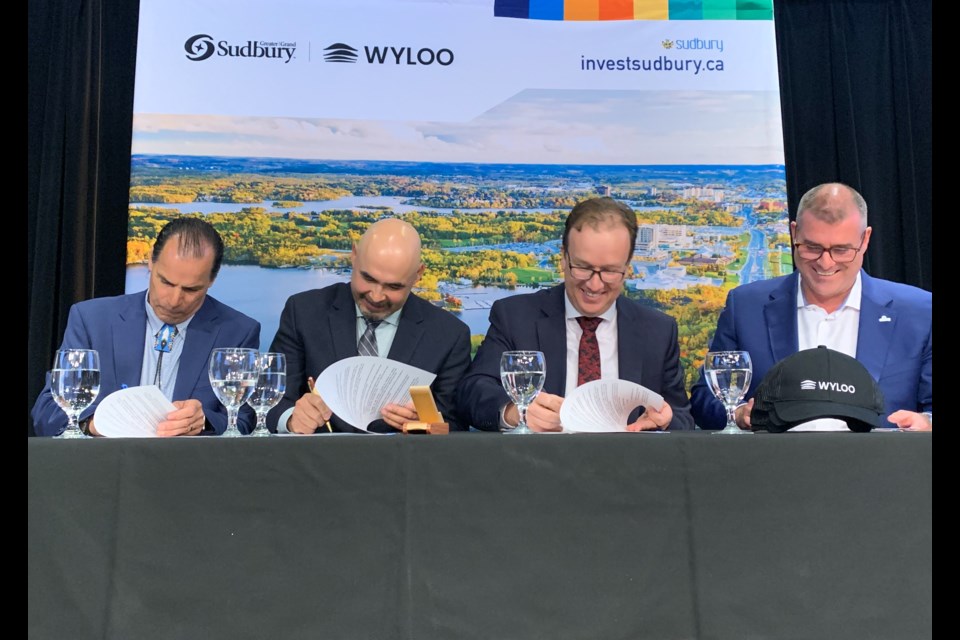Ring of Fire mine developer Wyloo has announced it has entered into a memorandum of understanding (MOU) with the City of Greater Sudbury, with local Indigenous support, to secure a parcel of land to build a downstream battery materials processing facility.
The announcement was made at the Battery Electric Vehicle conference in Sudbury, May 29.
A news release said the new facility will fill a critical gap in Canada’s electric vehicle (EV) battery supply chain by establishing Canada’s first mine-to-precursor cathode active material (pCAM) integrated solution.
The release did not specify the exact location in the city. No construction timelines were provided.
In a statement, Wyloo Canada's CEO, Kristan Straub, who was raised in the Greater Sudbury community of Falconbridge, said this facility will address the missing gap in developing Canada’s domestic EV battery supply chain.
The plant will produce low-carbon nickel sulphate and nickel-dominant pCAM, key ingredients for EV batteries.
“Recognizing the global demand for electric vehicles and other clean technologies, Canada has invested over $40 billion to date to establish the country as a global hub for the EV industry,” said Straub in the release.
“While we commend this investment, it has exposed a significant gap in the North American EV supply chain, specifically, the conversion of ore to battery chemicals,” he said.
“The urgency to bolster North America's capacity for processing metals — in particular, nickel — has never been more apparent. Our facility will be the missing piece that builds the capacity to process battery materials right here in Sudbury.”
The plant will be fed by nickel from Wyloo’s proposed Eagle’s Nest mine in the Ring of Fire region in the James Bay region, plus other sources of third-party nickel-bearing feed and recycled battery materials.
“With Eagle’s Nest as our anchor, combined with third-party feed from other North American sources, we are building enough capacity to meet 50 per cent of the nickel demand from the announced EV investments,” added Straub.
“Our commitment is to deliver a responsibly sourced supply of high-grade clean nickel from extraction to processing. This commitment aims to enable Canada, known for its unparalleled environmental standards and sustainable practices, to be a leader in local investment in downstream processing, establishing a stable and ethical supply chain without relying on imports from overseas.
Local Indigenous leaders are pleased to be involved on the consultation side. Wyloo said they will be involved as partners as the project progresses.
“We look forward to continuing the conversation and developing a partnership with Wyloo for this project,” said Atikameksheng Anishnawbek Gimaa Craig Nootchtai.
“Working together ensures our traditions and culture are incorporated in the economic development of the lands.”
“Being involved in these conversations is vital to our communities,” said Wahnapitae First Nation Chief Larry Roque. “The partnership set to be developed with this project will showcase what needs to be done for other First Nations and private companies.”
The City of Greater Sudbury said the community was selected for the plant location due to its global leadership in mining, being on the leading edge of clean technologies and its commitment to Indigenous reconciliation.
“Greater Sudbury has the land, the talent and the resources that are needed for the future of mining and BEV technology, as demonstrated by Wyloo selecting our community for the first Canadian facility of this kind,” said Mayor Paul Lefebvre in a statement.
“Our rich mining history, decarbonization efforts and sustainable mining practices set us apart, and have ensured that we are ready to support and drive innovation. We are a global mining hub that is investing in the future, and we look forward to working with Wyloo and local Indigenous partners as this project progresses.”




